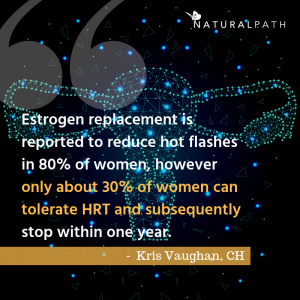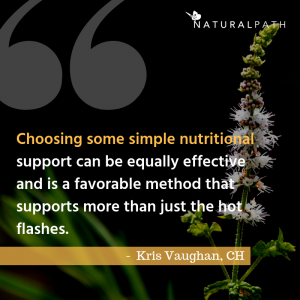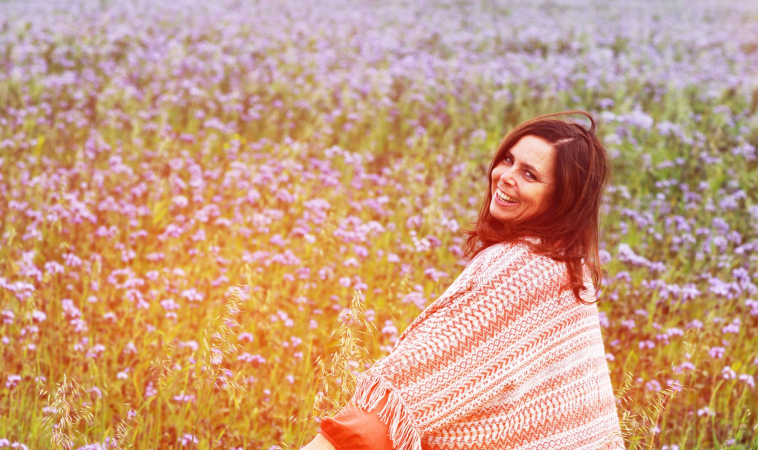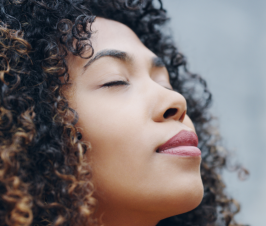The transition of menopause brings a variety of physical and emotional changes. Shifts in the estrogen and progesterone ratios bring about the common complaints of hot flashes, night sweats, and mood swings. Physiologically, every woman goes through the same transition but each woman experiences this in a very different way based on societal beliefs, lifestyle, and nutrition. In the United States, menopausal complaints are often reported as severe and requiring treatment while women in non-Western cultures report a completely different set of symptoms and severity. Simple shifts in societal beliefs, nutrition and supplementation offer foundational support for a normal healthy transition into the menopausal years.
Societal Beliefs About Menopause
In 1970, an anthropologist named Marcha Flint first began to look at the menopausal experiences of women in non-western cultures. She reported the most common complaint of women in the United States was hot flashes and night sweats. Women in India complained mostly of menstrual changes, and Japanese women reported shoulder stiffness as their main complaint. Hot flashes in non-Western cultures were rare and all non-Western cultures reported their symptoms as mild as opposed to women in the United States reporting their symptoms as severe and debilitating. If menopause is the same physiological process for all women, why are there such differences in physical complaints and severity? Are these differences related to diet, lifestyle, and beliefs surrounding aging and menopause?
In the youth-idolizing culture of the United States, menopause is often viewed as an ending of a free and youthful life and mature women are viewed with less respect for their femininity. In contrast, women in India who were veiled and secluded prior to menopause could “now come downstairs from their women’s quarters to where the men talked and drank home brew” and could publicly visit and joke with men. The two societal perceptions of this life transition illustrate the different beliefs around aging and menopause and how they affect women in regards to symptoms during this time in her life.
 Nutritional Support for Menopause
Nutritional Support for Menopause
Hot flashes are often the result a rapid drop in estrogen levels and are most often what will lead a woman to estrogen replacement, or hormone replacement therapy (HRT). Estrogen replacement is reported to reduce hot flashes in 80% of women, however only about 30% of women can tolerate HRT and subsequently stop within one year. Choosing some simple nutritional support can be equally effective and is a favorable method that supports more than just the hot flashes.
Calcium protects the bones and reduces the risk of osteoporosis fractures. Foods with bioavailable calcium include dark leafy greens, seeds, almonds, tofu, sardines, beans and lentils, dairy, rhubarb and figs. The average woman consumes only 600 mg in her daily diet and must supplement to achieve the recommended amount of 1,500mg daily. Combining calcium with magnesium improves the absorption of calcium in the body.
Magnesium balances blood pressure and reduces a woman’s risk of stroke, supports and promotes restful sleep. It is important to know that while magnesium is needed for the absorption of calcium, calcium interferes with the absorption of magnesium. Women would have the most benefit from taking a calcium/magnesium supplement in the morning and mid-day and a magnesium only supplement in the evening. Minimum daily recommendation is 400mg daily.
Vitamin D is also important for the absorption of calcium for bone health and it supports mood balance and focus. The minimum daily requirement is 600-800 IU but most Americans are vitamin D deficient and will require more based on validation from a blood test from your healthcare provider.
Phytoestrogens are compounds found in plants that exert mild estrogenic effects in the body. These compounds are found in legumes such as soy, chickpeas, pinto beans, lima beans, alfalfa, seeds, fruits, vegetables, and whole grains. The high intake of phytoestrogens may explain why hot flashes and other menopausal complaints do not occur with the same degree in cultures that eat a primarily plant based diet.
 Botanical Support for Menopause
Botanical Support for Menopause
Herbs, or botanicals, offer balancing benefits for the female reproductive system during menopause and can be used as alternative or complimentary aspects of a supportive protocol for hot flashes.
Black cohosh (Cimicifuga racemosa) has been studied for its effectiveness in hot flashes. More than seven clinical trials showed it to be as effective as estrogen replacement therapy without the negative side effects and without the risk of stimulating estrogen driven cancers. Black cohosh was also found to be useful as a supportive treatment aiding the anti-proliferative effects of Tamoxifen.
Dong quai (Angelica sinensis) is a female tonic often used in combination with black cohosh or chamomile for hot flashes. A study of 55 women given tablets of Dong quai and chamomile reported 90% of women had reduction in hot flashes and night sweats over 12 weeks.
Chaste tree (Vitex agnus-castus) is often recommended at the beginning of menopause for menstrual irregularities and is considered a female reproductive tract regulator. A double-blind placebo controlled study showed that chaste tree reduced reports of anxiety and mood swings.
Adding nutritional and botanical support is an easy lifestyle change with big benefits
Nutritional and botanical support for menopause can easily become a lifestyle change that has a big impact on the severity of menopausal hot flashes. Reframing your beliefs around this transition into a stage of life that is about freedom and respect can make this transition something to look forward to rather than something to dread. A visit with a clinical herbalist or a naturopathic physician that has a background in botanical medicine can offer well-rounded and safe alternatives to HRT and a normal and comfortable transition through the menopausal years. Be sure to consult an herbalist or practitioner prior to implementing any botanical protocol if you have a history of estrogen dominant cancers or other health conditions and if you are taking HRT or other pharmaceutical medications.
Kris Vaughan’s Social Media Contacts
- Facebook: www.facebook.com/herbalwisdominstitute
- Instagram: @kris.vaughan
- Podcast: www.herbalwisdom.podbean.com Herbal Wisdom also available on iTunes and Google Play
- Website: www.herbalwisdominstitute.com
References:
“Calcium Supplementation in Postmenopausal Women.” Medscape, 21 Feb. 2011, https://www.medscape.com/viewarticle/737143_2.
Jennings, Kerri-Ann. “Top 15 Calcium-Rich Foods (Many Are Non-Dairy).” Healthline, Healthline Media, 27 July 2018, https://www.healthline.com/nutrition/15-calcium-rich-foods#section12.
“Are You Getting Enough Calcium?” Mayo Clinic, Mayo Foundation for Medical Education and Research, 3 Oct. 2018, https://www.mayoclinic.org/healthy-lifestyle/nutrition-and-healthy-eating/in-depth/calcium-supplements/art-20047097.
Get The Gloss. “Why You Need Magnesium in Midlife More than Ever.” Get The Gloss, https://www.getthegloss.com/article/why-you-need-magnesium-in-midlife-more-than-ever.
Kupfersztain, C, et al. “The Immediate Effect of Natural Plant Extract, Angelica Sinensis and Matricaria Chamomilla (Climex) for the Treatment of Hot Flushes during Menopause. A Preliminary Report.” Clinical and Experimental Obstetrics & Gynecology, U.S. National Library of Medicine, 2003
Kargozar, Rahele, et al. “A Review of Effective Herbal Medicines in Controlling Menopausal Symptoms.” Electronic Physician, Electronic Physician, 25 Nov. 2017, https://www.ncbi.nlm.nih.gov/pubmed/29403626.
“Menopause Around the World.” Women in Balance Institute, 19 Sept. 2014, https://womeninbalance.org/2014/09/17/menopause-around-the-world/.

Kris Vaughan is a Certified Clinical Herbalist and the Program Director of Herbal Wisdom Institute. She is also the Director of Practitioner Experience for Wise Woman Herbals®. Kris is a member of The American Herbalists Guild, is a certified Reiki practitioner, and is board certified as a Holistic Healthcare Practitioner by the American Association of Drugless Practitioners.

















